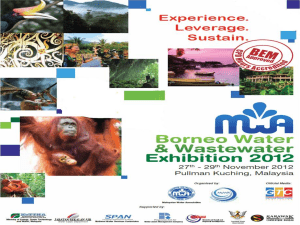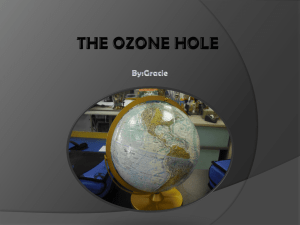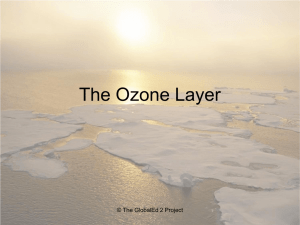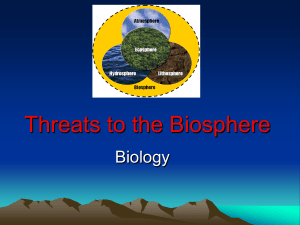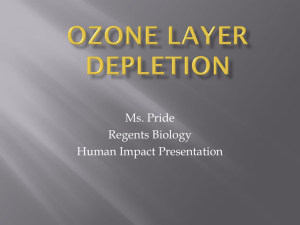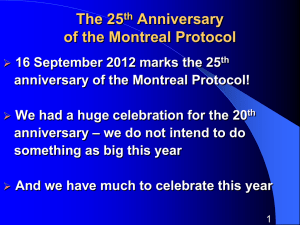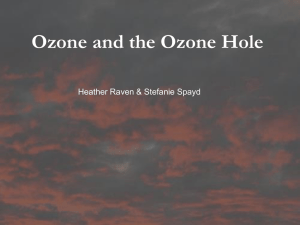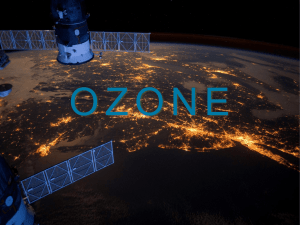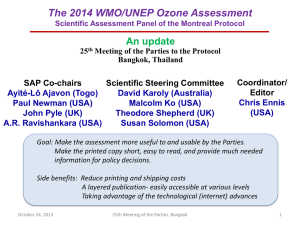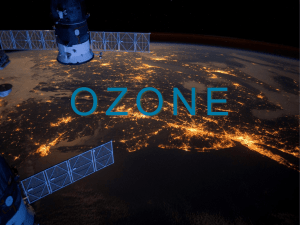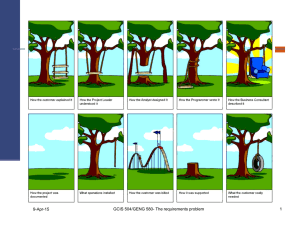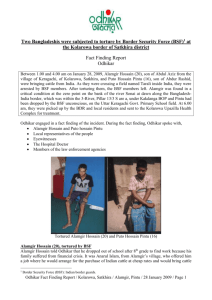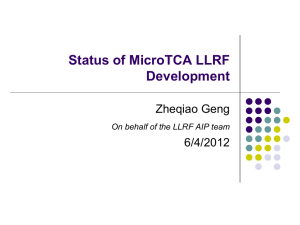Slide 1
advertisement
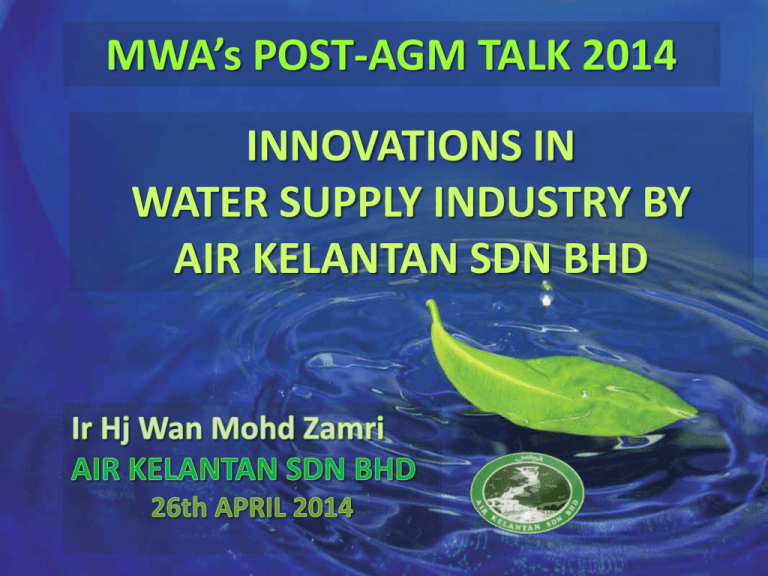
MWA’s POST-AGM TALK 2014 INNOVATIONS IN WATER SUPPLY INDUSTRY BY AIR KELANTAN SDN BHD WATER CRISIS WATER RATIONING BY OPERATORS INSPIRATION FOR ANSWERS FACT 1 َ ََوأ ض َوإِ َّنا ۖ ِ نز ۡل َنا ِم َن ٱل َّس َمآ ِء َمآ َۢ َء ِب َقدَ ر َفأ َ ۡس َك َّن ٰـ ُه ِفى ۡٱۡلَ ۡر ُون ِ ِۭ َع َل ٰى َذ َها َ ب ِب ِهۦ َل َق ٰـ ِدر “And We sent down water from the sky in measure, and We lodged it in the earth, and verily We are able to take it away” WATER CYCLE (Qs. Al-Mu’minûn [23]: 18), The word ‘fi’ (within) in the Qur’anic phrase /fil’ard / (within the ground), points to the possibility that indicates underground sources of water, not sources that are above the ground. FACT 2 CLIMATE CHANGE SCENARIO FACT 3 Presented By Harry Mills / PRESENTATIONPRO New Ideas : Green Technology Innovation Basic Of Green Ideas: A Solution to many problems Reduction in Costs Green Tech & Eco-friendly Innovative & Sustainable Economical & value engineering PERFORMANCE INDICATOR 1. Energy Efficient 2. Eco Friendly 3. Green Technology / Carbon Savings 4. Optimization of Treatment Process 5. Cost Savings INNOVATIONS BY AKSB 1. WATER SOURCE WORKS 2. HORIZONTAL COLLECTOR WELL (HCW) 3. OZONATION WITH BUBBLING FLOATATION METHOD OF OXIDIZING IRON&MANGANESE 1. WATER SOURCE WORKS 1.Management of aquifer recharge (MAR) 2.Enhancement system (RBF) of groundwater recharge-riverbank 3. Subsurface storage dams (Underground Reservoir) 4. River Barrage for Artificial Recharge 5. Consultation cost & Land acquisition filtration STORAGE = BUFFERING 3R concept – Recharge, Retention and Reuse • Local (cisterns) and subsurface storage (active use of aquifer) of surface water for both water- and food security • Its not about allocation of scarce water but to catch and retain water and extend the chain of use and reuse as possible within a basin • Introduce buffer management at scale – basin by basin. Not piecemeal/scattered • Subsurface storage largest potential in terms of Volume Rainfall Average Kota Bharu 2000-2010 25.0 20.0 15.0 Rainfall Average Kota Bharu 2000-2010 10.0 5.0 0.0 Jan Feb Mac Apr May Jun Jul Ogs Sep Oct Nov Dec KELANTAN RIVER BASIN RESERVOIR IN THE CITY CONCEPT River Barrage Functions 1. Control of Reservoir Level and Flood Control 2. To impound fresh water in reservoir and exclude seawater from entering the reservoir. 3. To release storm water flows to sea before the raising of the fresh water impoundment in reservoir for flood control and prevention. AN EXAMPLE OF RIVER BARRAGE STRUCTURE 2. HORIZONTAL COLLECTOR WELL (HCW) HCW SUNGAI Presented By Harry Mills / PRESENTATIONPRO Construction Process Of HCW Riverbank Filtration System – Advantages 3 Aspects of Reduction: REDUCTION ON COSTS -Operational Cost - Energy Cost COSTS - Maintenance Cost REDUCTION ON RISKS - Quality of Water RISKS - Failure on Operation - Environmental Damages REDUCTION ON THREATS - Climate Change Impact - Pollution of River - ‘War’ on Use of Water THREATS Energy Efficient & Costs Savings 1. Energy Costs reduced– + High Eff.Pumps & VSD 2. Maintenance is minimised – Excavators, Pumps 3. Filter operation is optimized – less backwash 4. Very Little Sludge – no sludge management 5. Optimization of WTP Whole Operation Energy savings up to 45% with the RBF effect and VSD usage. TURBIDITY OF RAW WATER (NTU) 2010 TURBIDITY OF RAW WATER (NTU) PRODUCTION AFTER COMPLETION OF JELI WTP WORKS RBF – HCW PROJECTS NO. WATER TREATMENT PLANT CAPACITY (mld) COMPLETION DATE 10 10/2010 1. Jeli-Pasir Dusun, Jeli 2. Ayer Lanas-Gemang, Jeli 8 4/2011 3. Kuala Balah, Jeli 8 4/2011 4. Stong-Dabong, Jeli 3 7/2011 5. Bertam Baru, Gua Musang 4 9/2012 6. Peralla, Tanah Merah 2 10/2012 7. Pasir Tumboh, Kota Bharu 25 12/2012 8. Wakaf Bunut, Pasir Puteh 25 12/2012 9. Pintu Geng, Kota Bharu 30 2/2013 10. Wakaf Bharu, Tumpat 20 2/2013 11. Sg.Ketil, Gua Musang 20 10/2013 12. Kelar, Pasir Mas (2 nos.) 50 PLANNING 27 28 KELANTAN EXPERIENCE : RBF IN JELI 29 JELI WTP WITH RBF SYSTEM SEDIMENTATION TANK AERATOR PROCESS UNIT FILTER TANK REFURBISH EXISTING BUILDING TREATED WATER PUMPS KELANTAN EXPERIENCE : RBF IN PINTU GENG, KOTA BHARU KELANTAN EXPERIENCE : RBF IN PINTU GENG, KOTA BHARU Presented By Harry Mills / PRESENTATIONPRO SUMMARY RIVERBANK FILTRATION SYSTEM (RBF) : KickOff Meeting 33 3. OZONATION WITH BUBBLING FLOATATION METHOD OF OXIDIZING IRON & MANGANESE fan ozone FI FI demister (option) water out water in ceramic disk diffusors ozone reaction tank AIR KELANTAN SDN BHD Presented By Harry Mills / PRESENTATIONPRO Objective of ‘Ozone-Oxidation’ • Oxidation of metals as iron and manganese • Tastes and odours removal • Oxidation of organic matters and micro pollutants • Algae Removal • Improvement of the coagulation • Colour removal • Reduction of THM 35 BENEFITS OF OZONE : TASTE AND ODOUR CONTROL • Taste and odour is often caused by Chlorination of natural organic compounds: phenol, hydrogen sulfide, algae,... • Chlorine + Phenol = taste + toxic compound • Oxidation of organics by ozone: • non toxic compounds • no taste and odour 36 BENEFITS OF OZONE : COLOUR REMOVAL • Colour in surface water is caused by natural organic matters (humic-, fulvic-, tannic acids,…) • These matters reveal C=C bonds • Ozone reacts with carbon double bonds • A dosage of 2 to 4 mg(O3)/L leads to a strong colour removal in most of the cases BENEFITS OF OZONE : IRON AND MANGANESE REMOVAL • Ozone oxidises ferrous and manganese to insoluble compounds • Chlorine does not oxidise manganese • Fe/Mn removal commonly takes place in pre-ozonation • Metal hydroxides may be removed on sand filters What is Ozone … O(3)ZONE .. The Molecule Molecular weight: 48 g/mol Density @ 1013 mbar, 0°C: 2,14 kg/m³ Max. limit for ambient level: 0,1 ppm Comparison of oxidants: -OH radical 0,2 mg/m³air - Chlorine 2,80 V 1,36 V Odor threshold: 0,01 ppm - Oxygen (mol.) 1,23 V Redox potential: 2,07 V - Chlorinedioxide 1,27 V - Hypochlorite 1,49 V Strongest oxidant, effective disinfectant ! Generation on site only ! Blue, pungent and strong smelling gas OZONE [greek = smelling] 39 NATURAL OZONE LIGHTNING-HIGH VOLTAGE OXYGEN O2 OXYGEN O2 OZONE O3 Ozone generation inside an electrical field Generator inlet Energy (Ozone Generator) Generator outlet Electrical Field Electrical Field Heat Oxygen containing feedgas (Air/LOX) Free oxygen atoms and oxygen molecules Product gas: Ozone-Feedgas mixture WEDECO EFFIZON HP Technology Ozone gas outlet Cooling water outlet High Voltage Ozone Generator Vessel Stainless Steel (316TI) (similar to tube heat exchanger) Cooling water inlet Grounded Feedgas inlet Cooling water Feedgas LOX/Air PI TI PASHL TI FI TI PI FIRC Cooling water M O3zone to process High Voltage Connection 5,500 V 1-1000 Hz Cooling water 400 V 50 Hz 5,500 V 1-1000 Hz ON Main Switch PSU 1 High PLC Main High Voltage Voltage Transformer Transformer Rectifier section > Inverter section > Step-up transformer Grounding PSU 2 Cooling water Switch Step-up transformer < Inverter section < Rectifier section 400 V 50 Hz Basics of Ozone generation Adavantages of WEDECO EFFIZON HP Electrode Long life operation (10 years guarantee) No maintenance for electrodes required Higher performance and efficiency concerning power consumption Better and efficient cooling More compact geometry leads to smaller foot prints Oxygen gas Supply PLC and SCADA Ozone destructors Ozone Generators Cooling Water supply Nano Bubbling systems Measurement devices Nano-Bubbling Method Effects Initial growth of plants Tap water Oxygen nano-bubble water THE OPERATION OF PINTU GENG WTP WATER QUALITY DATA : TREATED WATER ANALYSIS 10.00 9.00 8.00 7.00 6.00 Kekeruhan (NTU) pH 5.00 Baki Klorin (mg/L) 4.00 BESI,(Fe) 3.00 2.00 1.00 0.00 JAN Kekeruhan (NTU) pH Baki Klorin (mg/L) BESI,(Fe) FEB MAC JAN 6.13 5.91 0.39 2.39 APR FEB 7.29 6.20 0.19 1.98 MEI MAC 5.43 6.32 0.92 1.48 JUL APR 8.87 6.25 0.43 2.38 OGOS MEI 8.94 6.37 0.55 2.36 SEP JUL 0.42 7.02 1.63 0.11 OGOS 0.55 6.78 1.90 0.15 SEP 0.71 7.12 1.72 0.14 THE OPERATION OF PINTU GENG WTP WATER QUALITY DATA : TREATMENT ANALYSIS Pintu Geng WTP : Raw Water vs Treated Water 18 16 14 12 10 Raw water Oct 2013 Treated water Oct 2013 8 TARGET LEVEL 6 4 2 0 Fe Turb Mn pH Raw water Oct 2013 1.05 15.8 0.106 5.82 Treated water Oct 2013 0.09 0.24 0.014 6.68 TARGET LEVEL 0.3 5.0 0.1 6.8 THE OPERATION OF PINTU GENG WTP PRODUCTION COST DATA NO. DESCRIPTION COST (RM/M3) 1 LIQUID OXYGEN 0.035 2 INDUSTRIAL SALT 0.037 3 ENERGY (ELECTRICAL) 0.177 TOTAL PRODUCTION COST 0.249 1. 2. 3. 4. Deferum System – using only air to oxidize Iron & Manganese and without use of chemicals. Subterranean Iron Removal System – biochemical reaction in aquifer to treat groundwater in primary processes and without the use of chemicals. Organic Coagulant – use of natural herbs to produce an organic coagulant for flocculation processes in conventional WTP. 690V Low-Voltage Power Setup – to use 690V, instead of 415V, in powering the motors for higher efficiency in energy usage. 55
